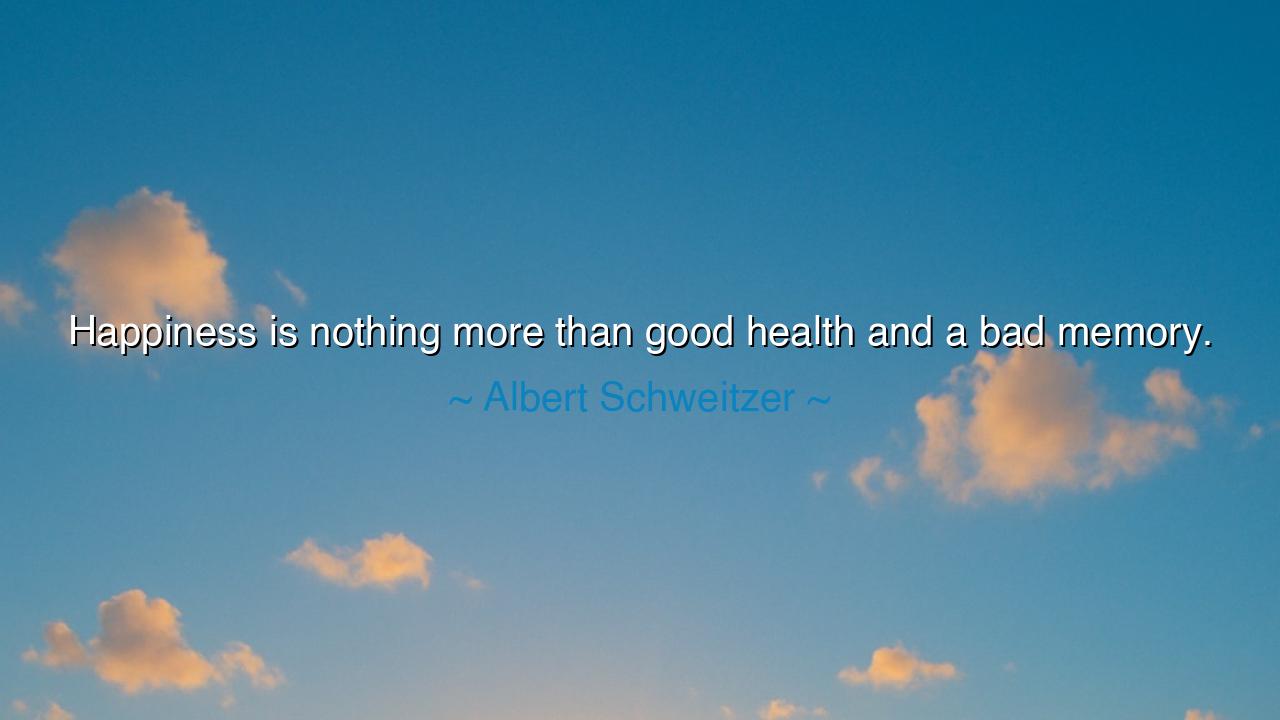
Happiness is nothing more than good health and a bad memory.






The words of Albert Schweitzer, “Happiness is nothing more than good health and a bad memory,” carry within them a gentle humor and yet a profound truth about the condition of the human soul. They remind us that happiness is not a treasure hidden in distant lands, but something far simpler—rooted in the balance of body and mind. To live well, Schweitzer teaches, one must cherish health, the harmony of life’s natural rhythms, and one must learn to forget what is best left behind—to release pain, resentment, and sorrow so that the spirit may breathe freely once more. For it is not what we carry, but what we can lay down, that determines our peace.
Albert Schweitzer was not a man of theory alone; he was a physician, philosopher, musician, and missionary—a man who lived the truth he spoke. The origin of this quote can be traced to his reflections on the human pursuit of joy during his years serving as a doctor in Lambaréné, deep in the forests of Gabon. There he witnessed both suffering and resilience in their rawest forms. He came to see that health was more than the absence of disease—it was a balance between body, mind, and conscience. And he observed that those who endured hardship with grace were those who did not dwell on past wounds. Thus, in his wisdom, he declared that a “bad memory”—the ability to forget pain and forgive life’s cruelties—was as essential to happiness as good health itself.
To say that good health is the first condition of happiness is to affirm the sacred bond between body and soul. The ancients, too, understood this. The philosopher Epicurus taught that the foundation of joy was a tranquil body and a calm mind. The one who is plagued by illness, constant fatigue, or self-neglect cannot easily rise to peace of spirit. Schweitzer, who healed the bodies of the sick, saw also that neglect of the body is a kind of moral blindness—a failure to honor the divine vessel through which life expresses itself. Thus, to care for one’s health is not vanity, but reverence.
Yet it is the second half of Schweitzer’s saying that pierces deepest. The “bad memory” is not a curse, but a gift—a selective forgetting that heals the wounds of experience. For memory can be a double-edged blade: it preserves wisdom, but it can also chain the heart to sorrow. Those who cannot forget live perpetually in yesterday’s grief. But the one who knows how to release the past—how to forgive, how to let go—discovers a peace that the burdened can never know. Just as the body purifies itself through breath, so must the mind purify itself through forgetting.
History offers a thousand mirrors to this truth. Consider Nelson Mandela, who, after twenty-seven years in prison, emerged not consumed by hatred but guided by forgiveness. He chose not to remember his tormentors with bitterness, but to remember the greater vision of freedom. His “bad memory” was not ignorance—it was wisdom. He forgot just enough of the pain to move forward, while remembering enough of the lesson to lead his people toward reconciliation. This was Schweitzer’s insight lived out in heroic form: that happiness belongs not to those who escape suffering, but to those who rise above it through the cleansing power of forgetfulness.
But forgetting is not denial—it is liberation. To forget is to accept that life is imperfect, that wrongs cannot always be undone, and that the heart must not dwell forever in the ruins of what has been lost. In this sense, the bad memory Schweitzer speaks of is a cultivated grace, a spiritual discipline. It is the art of choosing which memories to feed and which to starve. The mind, like a garden, blooms only where it is tended; and if we constantly water the weeds of resentment, joy cannot grow.
The lesson, then, is both simple and profound: guard your health, and guard your peace of mind. Cherish your body as the instrument of your journey, and train your mind to release the weight of old sorrows. Eat with gratitude, rest with respect, forgive with courage. Remember what gives life meaning; forget what steals it. For in the harmony of a healthy body and a merciful memory lies the quiet miracle of contentment.
So let these words endure as a compass for all generations: Happiness is not the absence of struggle, but the mastery of living lightly. When your body is well and your heart unburdened, you will find that joy arises naturally, like sunlight returning after a storm. And in that radiant calm, you will understand at last what Schweitzer meant—that true happiness needs nothing grand, only a sound body and a soul unchained from yesterday.






AAdministratorAdministrator
Welcome, honored guests. Please leave a comment, we will respond soon